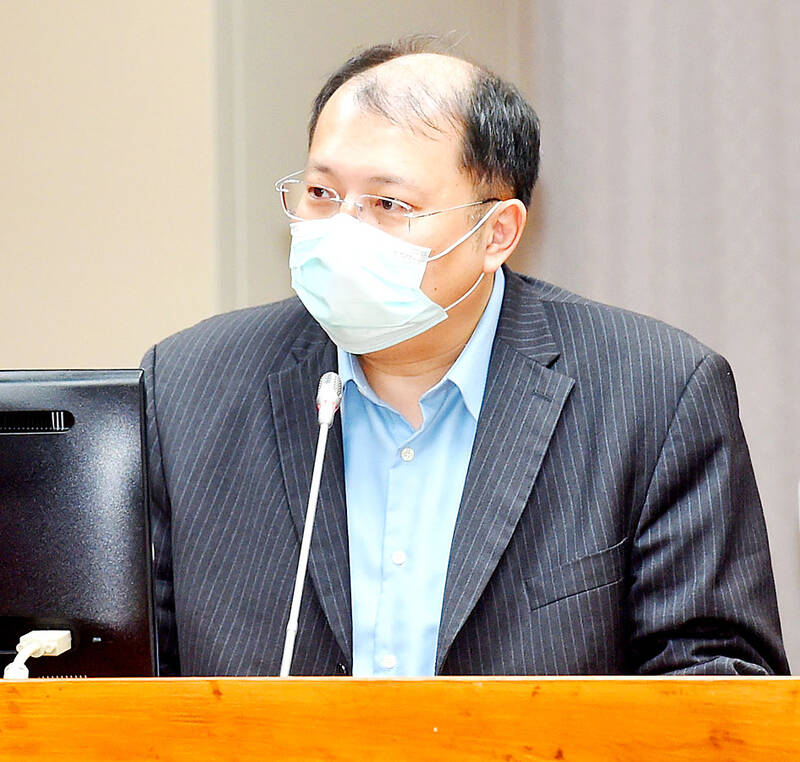Taiwanese and US security officials discussed how Taiwanese companies could adopt key US defense supply chain standards during a rare meeting on US soil in April, a senior government official said.
Deputy Minister of Digital Affairs Chiueh Her-ming (闕河鳴) met with representatives of the US National Institute of Standards and Technology (NIST) at the Taipei Economic and Cultural Office in San Francisco, the official said, asking not to be identified because they were not authorized to discuss security matters publicly.
The working-level meeting, organized by the American Institute in Taiwan, discussed the possibility of Taiwanese companies incorporating a US government cybersecurity standard called NIST 800-171, the official said.

Photo: Chu Pei-hsiung, Taipei Times
The standard is meant to protect the confidentiality of data labeled as “controlled unclassified information,” NIST said.
Chiueh met the NIST officials during a trip that included attending a security conference in San Francisco and meeting with representatives of major technology companies, the Ministry of Digital Affairs said in a statement.
The US is stepping up security support for and cooperation with Taiwan as Chinese President Xi Jinping (習近平) puts increased military pressure on the nation.
Ensuring that Taiwanese companies meet US defense supply chain standards would strengthen security ties between the two governments.
US defense contractors are generally required to comply with a range of key cybersecurity standards, which include the latest version of the Cybersecurity Maturity Model Certification, a program to safeguard sensitive information.
Other regional strategic partners of the US, such as Japan and South Korea, have already pushed their defense companies to seek the certification.
The Taiwanese delegation of nearly 20 officials and researchers on information security and defense discussed 5G communications and low Earth orbit satellites during the meeting.
Taiwan is preparing for the worst-case scenario of the destruction of its telecommunications and power lines in the event of an invasion by Beijing, Minister of Digital Affairs Audrey Tang (唐鳳) said in an interview last month.

SHIPS, TRAINS AND AUTOMOBILES: The ministry has announced changes to varied transportation industries taking effect soon, with a number of effects for passengers Beginning next month, the post office is canceling signature upon delivery and written inquiry services for international registered small packets in accordance with the new policy of the Universal Postal Union, the Ministry of Transportation and Communications said yesterday. The new policy does not apply to packets that are to be delivered to China, the ministry said. Senders of international registered small packets would receive a NT$10 rebate on postage if the packets are sent from Jan. 1 to March 31, it added. The ministry said that three other policies are also scheduled to take effect next month. International cruise ship operators

NUMBERS IMBALANCE: More than 4 million Taiwanese have visited China this year, while only about half a million Chinese have visited here Beijing has yet to respond to Taiwan’s requests for negotiation over matters related to the recovery of cross-strait tourism, the Tourism Administration said yesterday. Taiwan’s tourism authority issued the statement after Chinese-language daily the China Times reported yesterday that the government’s policy of banning group tours to China does not stop Taiwanese from visiting the country. As of October, more than 4.2 million had traveled to China this year, exceeding last year. Beijing estimated the number of Taiwanese tourists in China could reach 4.5 million this year. By contrast, only 500,000 Chinese tourists are expected in Taiwan, the report said. The report

The Forestry and Nature Conservation Agency yesterday launched a gift box to market honey “certified by a Formosan black bear” in appreciation of a beekeeper’s amicable interaction with a honey-thieving bear. Beekeeper Chih Ming-chen (池明鎮) in January inspected his bee farm in Hualien County’s Jhuosi Township (卓溪) and found that more than 20 beehives had been destroyed and many hives were eaten, with bear droppings and paw prints near the destroyed hives, the agency said. Chih returned to the farm to move the remaining beehives away that evening when he encountered a Formosan black bear only 20m away, the agency said. The bear

HORROR STORIES: One victim recounted not realizing they had been stabbed and seeing people bleeding, while another recalled breaking down in tears after fleeing A man on Friday died after he tried to fight the knife-wielding suspect who went on a stabbing spree near two of Taipei’s busiest metro stations, Taipei Mayor Chiang Wan-an (蔣萬安) said. The 57-year-old man, identified by his family name, Yu (余), encountered the suspect at Exit M7 of Taipei Main Station and immediately tried to stop him, but was fatally wounded and later died, Chiang said, calling the incident “heartbreaking.” Yu’s family would receive at least NT$5 million (US$158,584) in compensation through the Taipei Rapid Transit Corp’s (TRTC) insurance coverage, he said after convening an emergency security response meeting yesterday morning. National